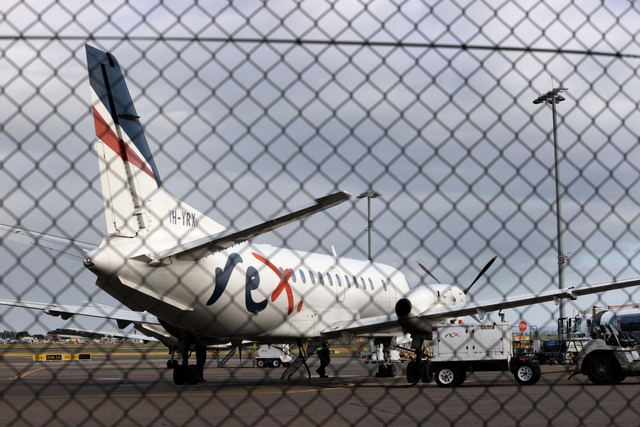The Aviation White Paper was released this past month by Catherine King, Federal Infrastructure Minister, and it’s worth a read.
It was written by departmental officials and consequently it’s a bit long-winded, but it covers the gamut of public policy issues like airport planning and noise, skills and training, net zero, disability standards, job security etc.
The headline was the changes to the Sydney Airport slot arrangements to drive more competition on flights to/from Sydney. Interestingly, John Sharp, Rex’s deputy chair, has been agitating for this reform for at least five years, and it led to the 2021 report by Peter Harris that recommended those reforms. Rex management must surely be grinding its collective teeth, given it’s now under administration and probably can’t bid for those slots.
However the White Paper danced around the elephant in the room – regional airfares. It noted that the ticket price per kilometre was on average 52 per cent higher for return flights to or from a non-capital city than those between two capital cities.
But it made no decisions. Instead it handballed the issue to the Productivity Commission, asking it to (i) review regional airfares and identify impediments to lower airfares and (ii) identify the misuse of market power. The process of the PC undertaking that work, and the feds then consulting and making decisions, will now involve further delays! Meanwhile regional Australia continues to be severely disadvantaged.
Let’s cut to the chase
The feds can’t keep faffing around on regional aviation – there has to be government leadership because of the numerous public issues involved. Regional business, residents and tourists deserve these issues to be taken out of the ‘too hard basket’.
If governments are serious about regional Australia, they could be setting an ‘aspirational’ target whereby fares on designated regional routes should be within say 25 per cent of those on capital city routes.
The naysayers will dismiss such a target as unrealistic, and the White Paper didn’t dare suggest anything like this.
However, a key plank of the White Paper is the proposed Ombuds (the new jargon for Ombudsman). He/she will have a Customer Rights Charter, with powers to direct airlines and airports to provide remedies to consumers experiencing flight cancellations and delays, repayment of refunds etc.
The Ombudsman is to be legislated by the federal parliament, so I’m hoping that politicians with a real interest in regional Australia can convince the Albanese Government to widen the Charter to include the wider issue of regional airfares.
Take for example, Swan Hill, an important regional city 340km north-west of Melbourne. Until recently, Qantas flights from Swan Hill to Melbourne were via Sydney, at a cost of around $368 to $412. These services have now been discontinued and Swan Hill is no longer serviced by any commercial airline.
Broken Hill is another important regional city because of its minerals and tourism sectors. Until recently, Virgin serviced the city, with one-way flights to Adelaide at around $465. Virgin is understood to have ceased these services, with Rex taking over with one-way fares between $199 and $229.
Two airline policy mindset
The Swan Hill example is a prima facie indicator of market failure, while the Broken Hill example suggests there is room for a third airline.
In any case, there is a long-held view among government policymakers that Australia’s geographic circumstances can’t sustain more than two airlines. This thinking surely belongs in the 1960s and 1970s when our population was half the current level. So, when Bonza, Compass, Impulse, Tiger and now Rex have faced big troubles in becoming the third airline, their complaints about unfair competition and predatory pricing from the two dominant players have been swept under the carpet.
The almost mythological Tyranny of Distance lives on, and with it the conventional wisdom is that it’s simply a matter of getting bums on seats to generate economies of scale. This is only part of the picture.
My contacts are saying that the current aviation policy doesn’t properly appreciate that smaller aircraft are squeezed out by predatory pricing (or the threat thereof), government intransigence on input costs and regulatory costs, high landing costs (regional councils take note) and lack of alternative transport options (e.g. antiquated trains).
If the White Paper is to match its rhetoric, these types of market failure need to be addressed. Hopefully the incoming Ombudsman’s mandate can be widened to cover this. In any case, the Ombudsman needs to be proactive, free-spirited and persistent – and not beholden to the Minister to express an opinion.
Rex in the Bush
Rex operates a milk run between Brisbane and Mt Isa – a 30 seat turboprop aircraft that makes stops at Toowoomba, Charleville, Quilpie, Windorah, Birdsville and Bedourie. These are quintessential Aussie communities. The flight takes nine hours, but should be a fantastic experience for tourists, and a necessary service for Outback dwellers.
It’s a great example of innovative thinking by Rex and the Queensland Government, with the latter providing subsidies to keep the cost at $299. Here’s hoping that the concept of a milk run can be extended to other routes.
Meanwhile one of our Albany members has provided some interesting intel, as follows: ‘Rex were/are good operators and were responsive and attentive to local feedback eg access to cheaper seats for locals 24 hours before the flight, and basing an aircraft in Albany overnight so our business travellers could be on the Terrace by start of business.’
Federal reform
Qantas’ poor behaviour in recent times has been the catalyst for the White Paper. It has shifted consumer sentiment, and there is an expectation now that the feds will deliver on strong policy reform in the aviation market. Indeed, there is a view that if Qantas can’t lift its game in the regional aviation market, then the feds might facilitate its exit from that market segment altogether.
Rod Brown is a Canberra-based lobbyist specialising in industry/regional development. Email apdcockatoo@iprimus.com.au

















